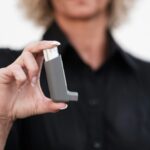Managing asthma involves recognizing and avoiding a variety of triggers. While physical factors like allergens and weather conditions are commonly known, emotional stress and exercise can also play a significant role in causing asthma flare-ups. Understanding how emotions and physical activity can affect asthma and learning how to manage these triggers is essential for maintaining respiratory health and reducing symptoms.
How Emotions Can Trigger Asthma Symptoms
Emotions such as stress, anxiety, excitement, and anger can trigger asthma symptoms in many individuals. Emotional stress can lead to physiological changes in the body that affect your breathing and airways.
1. Stress and Anxiety
- How they affect asthma: When you’re stressed or anxious, your body releases stress hormones like cortisol and adrenaline. These hormones can tighten your airways, making it harder to breathe and triggering asthma symptoms like wheezing, coughing, and chest tightness.
- What you can do: Practice relaxation techniques such as deep breathing, meditation, and mindfulness to manage stress. Regular exercise and adequate sleep can also help lower stress levels. Consider talking to a therapist or counselor if anxiety is a frequent trigger.
2. Strong Emotional Reactions (Anger, Excitement)
- How they affect asthma: Intense emotions such as anger or excitement can lead to rapid breathing and hyperventilation, which can trigger asthma symptoms in some individuals. This is because the sudden change in breathing patterns can irritate the airways.
- What you can do: Try to stay calm during emotionally intense situations. Techniques such as counting to 10, deep breathing, or visualizing a peaceful scene can help control your emotions and prevent asthma symptoms from worsening.
3. Depression
- How it affects asthma: Depression can indirectly affect asthma by causing changes in sleep patterns, reducing physical activity, and increasing stress. Poor mental health can contribute to an overall increase in asthma symptoms.
- What you can do: Take steps to improve your mental health by seeking support, whether through therapy, support groups, or medication. Improving mental well-being can help reduce asthma flare-ups linked to emotional triggers.
How Exercise Can Trigger Asthma Symptoms
Exercise is essential for overall health, but for some individuals with asthma, physical activity can trigger symptoms. This is known as exercise-induced bronchoconstriction (EIB) or exercise-induced asthma. Understanding the connection between exercise and asthma is important for maintaining an active lifestyle while managing symptoms.
1. Exercise-Induced Bronchoconstriction (EIB)
- How it affects asthma: EIB occurs when physical activity causes the airways to constrict, leading to symptoms such as coughing, wheezing, shortness of breath, and chest tightness. It typically occurs during or after exercise and can be triggered by factors such as cold, dry air, or intense exertion.
- What you can do: If you experience EIB, use your inhaler (usually a short-acting bronchodilator) 15-20 minutes before exercise to help prevent symptoms. It’s important to gradually warm up before exercise and cool down afterward to minimize symptoms. Choose activities that are less likely to trigger EIB, such as swimming, walking, or yoga.
2. High-Intensity Workouts
- How they affect asthma: Intense physical activities, such as running or vigorous aerobic exercise, can trigger asthma symptoms, especially in cold or dry environments. The body requires more air, which can irritate sensitive airways and cause a flare-up.
- What you can do: If you’re prone to exercise-induced asthma, consider reducing the intensity of your workouts. Opt for moderate-intensity exercises and take breaks to ensure you’re not overexerting yourself. Wearing a scarf or mask over your mouth and nose in cold weather can help warm the air before it reaches your lungs.
3. Allergy-Induced Exercise Trigger
- How it affects asthma: For individuals with asthma and allergies, allergens like pollen or dust can trigger asthma symptoms during outdoor activities. Exercise may exacerbate allergic reactions, leading to inflammation of the airways.
- What you can do: Check pollen counts and air quality before exercising outdoors, especially in allergy season. Consider exercising indoors when pollen counts are high or the air quality is poor. Take your asthma medications as prescribed and ensure you’re using an inhaler before exercise to prevent flare-ups.
Managing Asthma During Emotional Stress and Exercise
Here are some strategies to manage asthma triggered by emotions and exercise:
1. Monitor and Manage Your Emotions
- Practice mindfulness: Techniques such as meditation, deep breathing, and progressive muscle relaxation can help reduce stress and calm your nervous system, which can help control asthma symptoms.
- Stress management: Regular physical activity, a balanced lifestyle, and adequate sleep can reduce overall stress. Talk to a mental health professional if emotional triggers are frequent.
2. Create a Consistent Exercise Routine
- Warm-up and cool-down: Ensure a gentle warm-up and cool-down routine before and after exercise to minimize the risk of triggering asthma.
- Stay hydrated: Drink plenty of water before, during, and after exercise to keep your airways moist and reduce irritation.
- Choose asthma-friendly exercises: Consider low-impact exercises like swimming, walking, or biking, which are generally easier on the lungs and less likely to trigger asthma symptoms.
3. Work with Your Healthcare Provider
- Adjust medication: Discuss your exercise and emotional triggers with your doctor. They may recommend adjustments to your asthma action plan, such as using a daily controller inhaler or a pre-exercise inhaler.
- Asthma action plan: Work with your healthcare provider to develop an asthma action plan that includes guidance on how to manage symptoms triggered by exercise or emotions.
Conclusion
Both emotions and exercise can significantly impact asthma symptoms. By understanding how stress, anxiety, and physical exertion affect your airways, you can take proactive steps to manage these triggers. With the right strategies and a solid asthma management plan, you can continue to lead an active and balanced life while minimizing asthma flare-ups. Always consult your healthcare provider for personalized advice on managing emotional and exercise-induced asthma triggers.












